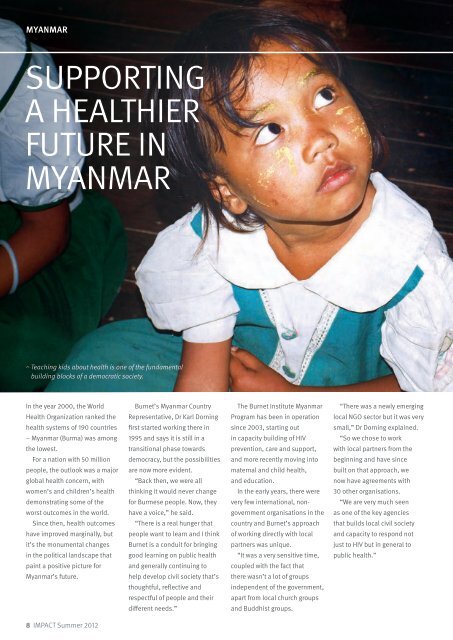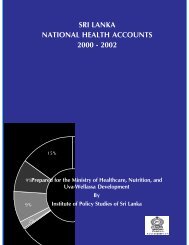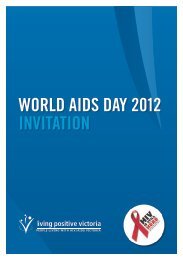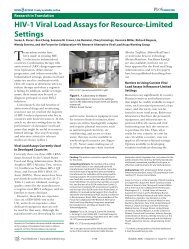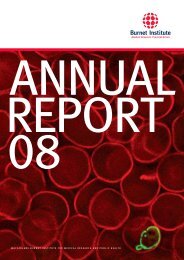MYANMARSUPPORTINGA HEALTHIERFUTURE INMYANMARTeaching kids about health is one of the fundamentalbuilding blocks of a democratic society.In the year 2000, the WorldHealth Organization ranked thehealth systems of 190 countries– Myanmar (Burma) was amongthe lowest.For a nation with 50 millionpeople, the outlook was a majorglobal health concern, withwomen’s and children’s healthdemonstrating some of theworst outcomes in the world.Since then, health outcomeshave improved marginally, butit’s the monumental changesin the political landscape thatpaint a positive picture forMyanmar’s future.<strong>Burnet</strong>’s Myanmar CountryRepresentative, Dr Karl Dorningfirst started working there in1995 and says it is still in atransitional phase towardsdemocracy, but the possibilitiesare now more evident.“Back then, we were allthinking it would never changefor Burmese people. Now, theyhave a voice,” he said.“There is a real hunger thatpeople want to learn and I think<strong>Burnet</strong> is a conduit for bringinggood learning on public healthand generally continuing tohelp develop civil society that’sthoughtful, reflective andrespectful of people and theirdifferent needs.”The <strong>Burnet</strong> <strong>Institute</strong> MyanmarProgram has been in operationsince 2003, starting outin capacity building of HIVprevention, care and support,and more recently moving intomaternal and child health,and education.In the early years, there werevery few international, nongovernmentorganisations in thecountry and <strong>Burnet</strong>’s approachof working directly with localpartners was unique.“It was a very sensitive time,coupled with the fact thatthere wasn’t a lot of groupsindependent of the government,apart from local church groupsand Buddhist groups.“There was a newly emerginglocal NGO sector but it was verysmall,” Dr Dorning explained.“So we chose to workwith local partners from thebeginning and have sincebuilt on that approach, wenow have agreements with30 other organisations.“We are very much seenas one of the key agenciesthat builds local civil societyand capacity to respond notjust to HIV but in general topublic health.”8 IMPACT Summer 2012
RESPONDING TOCYCLONE NARGISOne of the many successstories of <strong>Burnet</strong>’s involvementin Myanmar was a project DrDorning helped set up as part ofthe response to the devastatingCyclone Nargis in 2008, the LocalResource Centre or LRC.Funded by AusAID, the LRCacted as a resourcing tool forlocal civil society groups todevelop healthcare capacity andhumanitarian assistance, andhas now become its own NGO.<strong>Burnet</strong> <strong>Institute</strong> Director andCEO, Professor Brendan Crabbsays the <strong>Institute</strong> is well acceptedand respected in Myanmar.“It’s a real testament to ourapproach that we have beenthere so long, through difficultyears, and I think the reason wehave stood the test of time is thatwe have always done just whatwe said we were going to do,”Professor Crabb said.“There is nothing else to<strong>Burnet</strong>, we are not there tomake money or to influence thepolitical or social agenda, we arethere to improve the well beingof the people by improving theiraccess to good health, that’s it.”Professor Crabb believeswith the shift in politicalcircumstances, organisationslike <strong>Burnet</strong> will have morefreedom to build better linksand capacity to strengthengovernment health systems,not just non-government.“<strong>Burnet</strong> is working closelywith government health staffutilising them as trainers inprograms, while also facilitatingpartnerships between privatesector businesses andgovernment health facilities toincrease the involvement of menin maternal and child health.These two elements would nothave been possible 12 monthsago,” he said.FOCUS ONEDUCATIONThe <strong>Institute</strong> has also beenheavily involved with theeducation sector, particularly theMonastic School system (similarto the Catholic school system inAustralia) since Cyclone Nargis.“We got involved with a lotof health-focused areas afterNargis, training teachers howto deal with trauma in theclassroom, and also helpingto re-build schools, makingsure they had good waterand sanitation systems,”Dr Dorning said.The <strong>Institute</strong> is also a memberof the Myanmar EducationConsortium, a multimilliondollar fund from AusAID andother donors, that will providesupport to non-state educationand will help scale up the schoolwater, sanitation, hygiene andnutrition program.Dr Dorning said from a publichealth perspective, teachingkids about health is one of thefundamental building blocks of ademocratic society.“So through training in basichygiene, sanitation and nutrition,teachers can be a real key inchanging the basic patterns ofpreventable diseases – simplethings like washing your handsafter you go to the toilet or beforeyou eat.”BURNET HELPSTRAIN MIDWIVESAND COMMUNITYWORKERS TO IMPROVEHEALTH OUTCOMESFOR MOTHERS ANDTHEIR CHILDREN.LOOKING AHEAD<strong>Burnet</strong> will be working towardsengaging with a multi-donorfunding mechanism prioritising,maternal and child health, HIV,malaria and tuberculosis, andhealth systems strengthening.This opportunity will pavethe way for <strong>Burnet</strong> to make themost of the increased optionsfor capacity building and healthservice delivery.“We will be able to do somereally innovative work with thegovernment and local NGOsin new geographic areas,”Dr Dorning said.More access to funding andthe political changes has alsoopened the door for <strong>Burnet</strong>’sMyanmar office to develop itsresearch profile.“It’s been difficult in the pastto do research in the countrybecause it has been viewed assensitive, the government didn’twant information getting outthat could be viewed as critical,”he said.“We don’t want to criticise, wejust want to collect evidence todecide on the best way forward toachieve better health outcomesin Myanmar. We want to workwith government, so we’recollaborating with the Departmentof Medical Research on a numberof research programs.”CURRENT PROJECTSIMPROVING MATERNAL AND CHILDHEALTH (MCH) OUTCOMES THROUGHINCREASING HEALTH SEEKINGBEHAVIOURS AND ACCESS TOQUALITY MCH SERVICES.This project supports increasedcommunity demand for health servicesthrough better health knowledge ofmothers about pregnancy, delivery andpostpartum care by supporting facilitybasedcare, with essential equipmentand commodities.MALE PARTICIPATION IN IMPROVINGMATERNAL AND NEWBORN HEALTH:A COMMUNITY-BASED INTERVENTION.Increasing men’s knowledge about waysthey can support the health of theirpartners and children is vital. Men areencouraged to come to antenatal clinicsand the clinics are made more malefriendly,and health care workers are giventhe skills and confidence to engage withmen more effectively.IMPROVING COMMUNITY-BASEDNEONATAL CARE IN MYANMAR.Improving the skills of basic health staff,auxiliary midwives and community birthassistants and provides higher qualityneonatal care.IMPACT Summer 2012 9


